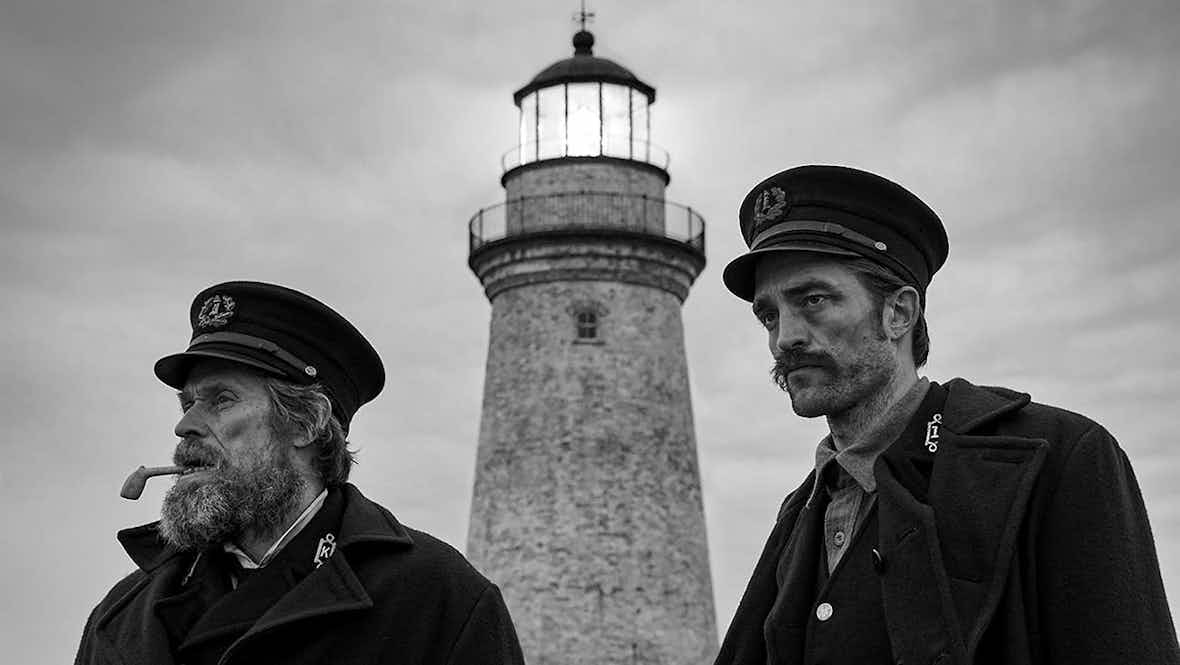Robert Pattinson shines in The Lighthouse

Review: Robert Eggers, directing fearlessly, paints a vivid scene that he will subsequently take a mean pleasure in trashing.
Culture
Words: Caspar Salmon
Rating: 5/5
What counts as a spoiler and what is acceptable as mere description of the bluster and folderol of a movie high in colour? The Lighthouse presents a particular problem for the reviewer in that explaining its plot points (a man goes crazy while trapped in a remote lighthouse with a gruff lighthouse keeper) doesn’t ruin anything, but giving away certain visual treats or uproarious lines of dialogue could take away from the many great pleasures this film has to offer.
At its outset, The Lighthouse is all stark austerity, its craggy stars (Robert Pattinson and Willem Dafoe) appearing to come together to form one jutting cheekbone to rule them all. Pattinson is moustachioed and rangy; Dafoe’s wicked rodent features peak out of a heavy beard. In consciously antiquated black and white, their boat lashed by waves, staring past or into the camera in their turn, they could be the subjects of an early daguerreotype of workers.
Robert Eggers, directing fearlessly, paints a vivid scene that he will subsequently take a mean pleasure in trashing: that of Ephraim Winslow (Pattinson), arriving on a rocky island to work as second in command at a lighthouse to the terse and boozy Tommy Wake (Dafoe), who swiftly sets him to back-breaking work. In a handful of sensuous scenes (the movie’s language is dirt and oil, booze, stench, sweat and sea-spray) the film sketches this grim rapport, with Winslow soon becoming Dafoe’s grudging dogsbody.
At the same time, mysterious forces are clearly at play on the island – Winslow finds a mysterious, voodoo-like statue of a mermaid among the bristles of the pallet he sleeps on, and is attacked by a gull with a bad temper – that threaten to deregulate this routine. As the storms grow stronger and the pair seek refuge in drink, the power dynamic begins to shift and blur, both men switching between slurring friendship and bitter resentment; there appears to be a violent Oedipal quality to their relationship. Is Winslow losing his mind?
It’s hard to explain the madness that begins to descend, and the truly unique tone that Eggers alights on in conjunction with his actors as he subjects them to relentless degradations. Eggers’s photography has a blistering vividness to it, a very fine work on light and shade, and the film luxuriates in so much ooze and detritus. In a hilarious scene Winslow is charged with emptying the bedpans and trudges along a crag to chuck the excreta into the sea, whereupon a gust of wind flings them back in his face.
At another point, Dafoe carries on talking while being buried, his mouth and eye-sockets filling with clumps of earth as he spit-muffles his lines. The film’s language is almost a parody of high-flown sea-dog vernacular, and the film is jarringly funny, which sits so uneasily with its worrying editing and decoupage, its mesmeric dream sequences, its aggressive homoerotica and stern photography. Dafoe and Pattinson could not be more game: the former gives a barnstorming performance as the forbidding captain, chewing over meaty lines of invective, and Pattinson cheerfully degrades himself, sullying his looks with grime and working his objectified body to the bone. These are the elements that constitute spoiler material, the meat and drink of the movie: its sheer moxie, its risks and surprises.
With The Lighthouse, Eggers has crafted a great hulking beast of a film, an art entertainment, a honking nightmare come to life, a dirty cosmic joke that stinks of piss and moonshine. Don’t find out too much about it.

